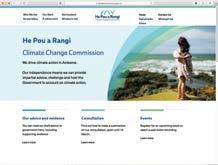
3 minute read
Natural resources and environment
YOUR LEVY AT WORK
INDUSTRY WIDE ISSUES FOR INDUSTRY GOOD
Natural resources and environment
Resource Management
The government has announced its intention to split the Resource Management Act into three different sets of legislation: • The Natural and Built Environments Act (NBEA) – to cover land use and environmental regulation. • Strategic Planning Act (SPA) – other legislation relevant to development and long-term regional spatial strategies. • Climate Change Adaptation Act (CAA) – managing retreat and funding/financing adaptation. Key points on the proposed Natural and Built Environments Act: • Regional and District Plans will be replaced by One
Plan per region. • Positive outcomes to the environment are to be identified and promoted prior to consideration of management of adverse effects. • Biophysical limits are seen as central to protecting and sustaining natural resources. • Those who exercise powers and functions under the
Act will be required to give effect to the principles of
Te Tiriti o Waitangi. • National direction will be consolidated into a ‘National
Planning Framework’. The proposed consultation will be via a select committee process. The key dates are a draft Bill in May, and then the Bill to be introduced to parliament and considered by select committee in December, with the intention that all three pieces of legislation be passed by the end of 2022. HortNZ will develop a submission on the draft Bill following consultation with product groups, district associations and growers.
Water
Water Services Bill
HortNZ is developing a submission on the Water Services Bill.
The bill will implement the government’s decision to comprehensively reform the drinking water regulatory system. The Bill establishes Taumata Arowai as the new national water services Regulator. Key points on the Water Services Bill: • The implementation of Te Mana o te Wai. • Drinking water suppliers to provide safe water through the development and implementation of safety plans. • The protection of source drinking water by suppliers through the development and implementation of source water protection plans. • Registration of drinking water suppliers. • Multiple barriers to contamination being adopted. • Ongoing monitoring and reporting. The new requirements for water suppliers will apply to anyone who supplies water to others for domestic purposes. These regulations will capture some irrigation schemes, and some small supplies serving multiple users such as packhouses and worker accommodation. HortNZ has been engaging with growers and irrigation schemes, and will make a submission in March.
Climate Change
Climate Change Commission
HortNZ is developing a submission on the Climate Change Commission advice to government on reducing emissions and adapting to climate change. Key points from the Climate Change Commission’s report: • New Zealand’s 2050 carbon zero target is achievable but not under current policy. • Three new targets: 2% reduction on 2018 greenhouse gas emissions by 2025; 17% cut by 2030; and a 36% cut by 2035. • Maximum cost of $33.7 billion across 14 years, which is suggested to be significantly lower than predicted due to technological advances. • Biggest impacts are to Transport (required emission reduction 50% by 2035) and heat, industry and power (required emission reduction 44.6% by 2035). • The cost of keeping emissions within the recommended carbon budgets is estimated at around 1% of
New Zealand’s GDP (Gross Domestic Product) in 2050. There are opportunities for horticulture identified within the report, with horticulture expansion identified as being an opportunity to achieve emissions reductions for New Zealand. The proposed reduction in the use fossil fuel for heat highlights the challenge of developing viable alternative heating sources for glasshouses. Feedback will be sought from product groups and district associations, and HortNZ will make a submission in March.


Go to www.climatecommission.govt.nz to see the full Climate Change Commission’s report.
re-energize your crops!
CARBOFUELTM is a complex foliar spray developed to address the carbohydrate levels in plants replenishing energy reserves for optimal growth and plant health. Agri Technovation formulated this product with alternate bearing in mind, in which this product assist mitigating yield in the ‘off’ years.

crop performance fuelled by science and technology










